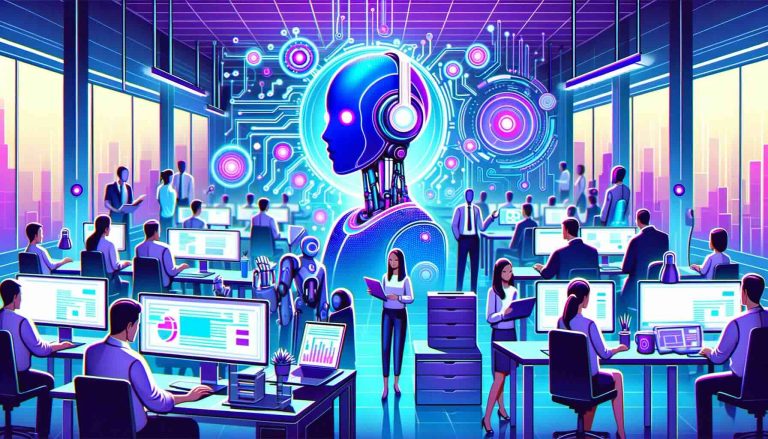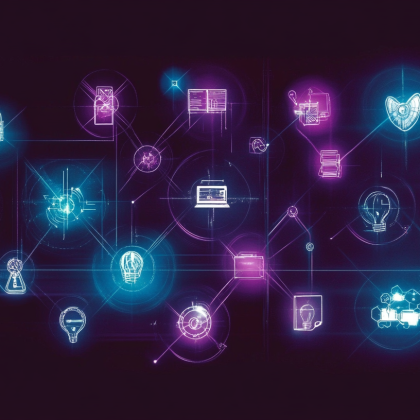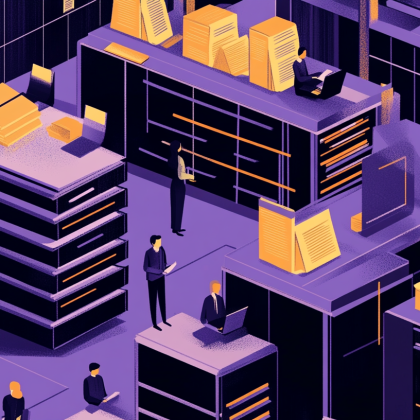How do you survive the AI revolution as a Data Professional?

The Impact of AI on Jobs in the Next 5 Years
As artificial intelligence (AI) continues to advance at an unprecedented pace, its impact on the job market is becoming increasingly evident. In the next five years, AI is expected to significantly disrupt the employment landscape, leading to the elimination of specific jobs and the creation of others. Examining the methodology used to predict AI’s impact on employment and the roles likely to be affected is crucial to better understanding this phenomenon.
Methodology for Predicting AI’s Impact on Jobs
Researchers and industry experts have developed various methods to forecast AI’s impact on the job market. One common approach is to analyze the tasks and skills required for each occupation and determine how AI can automate or complement these tasks. For example, the World Economic Forum’s Future of Jobs Report 2023 assesses the expected impact of technology adoption on jobs between 2023 and 2027, considering factors such as job creation, displacement, and the overall net effect.
Another framework introduced by the International Monetary Fund examines AI exposure and complementarity. AI exposure refers to the degree of overlap between AI applications and the human abilities required for each occupation. Conversely, complementarity reflects an occupation’s likelihood of being shielded from AI-driven job displacement. By combining these two parameters, researchers can identify jobs most vulnerable to automation and those likely to be complemented by AI.
Predictions on the Future of Data Science Job Roles
Predictions on how AI will reshape Data Science careers offer a mixed outlook. While some tasks may be subject to automation, the need for human expertise in problem-solving and strategic decision-making will persist. Here are some key trends and implications for Data Science professions:
Change in Job Titles and Roles
The term “data scientist” may decline as subject matter experts with data proficiency take on roles that blend technical skills with domain knowledge. Data scientists will likely work in tandem with AI, focusing on interpreting results and refining AI output.
Job Displacement and Creation
While AI is expected to displace specific jobs, it is also projected to create new opportunities. Estimates suggest that AI might replace 85 million jobs by 2025, but 97 million new jobs could emerge, reflecting the dynamic nature of the job market in the face of AI innovation.
Impact on Specific Industries
Industries heavily reliant on information processing, such as IT, finance, and legal services, are expected to see significant impacts from AI. Data Science roles that revolve around programming and writing skills are the most exposed to automation in these sectors.
## Conclusion The AI revolution will continue to shape Data Science professions well beyond 2024. While automation threatens specific jobs, it also opens up opportunities for data scientists to evolve their roles, acquire new skills, and embrace the transformative potential of AI. As the profession adapts to these changes, data scientists will remain integral to the operationalization and scaling AI across organizations. Therefore, the future of Data Science lies not in obsolescence but in transformation, with professionals who are prepared to navigate the complexities of AI poised to thrive in the years to come.
Jobs Predicted to See the Most Growth
While some jobs may decline, others will experience significant growth in the coming years. Roles related to AI and machine learning, such as AI specialists, business intelligence analysts, information security analysts, and data analysts, are projected to be in high demand. As organizations increasingly adopt AI technologies, the need for professionals to develop, support, and manage these systems will continue to rise.
Additionally, jobs focused on sustainability and the environment are expected to grow substantially as concerns about climate change and ecological issues gain more attention. Trades roles, such as robotics workers, are also anticipated to experience increased demand. Furthermore, the education sector will likely witness job growth as the need for skilled professionals to train the future workforce becomes more pressing.
What to Do if Your Job is Likely to be Impacted by AI
As artificial intelligence (AI) continues to advance and reshape the job market, many individuals may find themselves in roles likely to be impacted by this technology. If you find yourself in this situation, it is essential to proactively explore your options and take steps to secure your career in the face of these changes. Two main paths can help you navigate this AI-driven landscape: adapting your current role to embrace AI or considering a transition to a more AI-proof career.
Option 1: Adapt Your Current Role to Embrace AI
If you are passionate about your current job and want to continue in your field, adapting your role to incorporate AI can be a smart move. By embracing the technologies transforming your industry, you can protect your position, enhance your productivity, and open up new growth opportunities.
For example, if you are in a creative field such as art or entertainment, familiarizing yourself with AI tools like DALL-E, Midjourney, or Sora can help you generate new ideas, streamline your workflow, and stay at the forefront of your industry. Similarly, I work in a field like security. Exploring how AI can be integrated into existing systems can help you develop innovative solutions and maintain relevance in the changing landscape.
Option 2: Consider Transitioning to a More AI-Proof Career
If your current role is at high risk of being automated or not particularly attached to your current field, transitioning to a more AI-proof career may be the best path forward. By focusing on roles less likely to be impacted by AI, you can secure a more stable and promising future.
To identify potential career paths, examine the list of jobs projected to experience the most growth in the coming years. These roles often involve difficult-to-automate tasks requiring creativity, critical thinking, or interpersonal skills. Some examples include AI and machine learning specialists, sustainability experts, robotics workers, and professionals in the education sector.
Develop a Plan to Acquire Necessary Skills and Qualifications
Whether you adapt to your current role or transition to a new career, developing a plan to acquire the necessary skills and qualifications is crucial. Start by researching the specific requirements for the roles you are interested in and identifying gaps in your current skill set.
Next, explore the various resources available to help you bridge these gaps. Online learning platforms, professional development courses, and mentorship programs can all be valuable tools in your upskilling journey. Don’t be afraid to reach out to professionals in your desired field to gain insights into their experiences and seek advice on how to break into the industry.
Commitment to continuous learning and adaptability is the key to success in an AI-driven job market. By staying informed about the latest trends, technologies, and in-demand skills, you can position yourself to thrive in the face of these changes and build a rewarding career in the age of AI.
Leveraging AI to Enhance Your Career Prospects
As artificial intelligence (AI) continues transforming the job market, professionals must understand how to harness this technology to enhance their career prospects. Rather than viewing AI as a threat, embracing it as a tool to boost productivity, creativity, and competitiveness can help you stay ahead of the curve and thrive in your chosen field.
Embracing AI Tools to Boost Productivity and Creativity
One of AI’s most significant benefits is its ability to streamline tasks and improve efficiency. By incorporating AI tools into your daily work routine, you can automate repetitive processes, freeing up more time to focus on high-value, strategic tasks. For example, AI-powered writing assistants can help you generate ideas, improve grammar and style, and create higher-quality content in less time.
Moreover, AI can serve as a powerful catalyst for creativity. Tools like DALL-E, Midjourney, and Sora can help you generate unique visual concepts, spark new ideas, and push the boundaries of your creative thinking. By experimenting with these tools and integrating them into your creative process, you can develop innovative solutions and stand out in your field.
Staying Ahead of the Curve by Adopting New Technologies Early
In today’s rapidly evolving job market, staying up-to-date with the latest AI technologies is crucial for long-term success. Proactively seeking out and adopting new tools and platforms can position you as an early adopter and gain a competitive edge in your industry.
To stay informed about emerging AI technologies, regularly follow industry blogs, attend webinars and conferences, and engage with thought leaders in your field. As new tools become available, experiment with them and assess how they can be applied to your specific role or industry. You can showcase your value as a forward-thinking professional by demonstrating a willingness to embrace change and adapt to new technologies.
Using AI to Stand Out in a Competitive Job Market
Leveraging AI can help you differentiate yourself from other candidates in a crowded job market and catch potential employers’ attention. By highlighting your experience and proficiency with AI tools on your resume and online profiles, you can demonstrate your ability to thrive in an AI-driven landscape.
Consider using AI to create a more engaging and interactive job application. For example, you could use AI-powered design tools to create a visually stunning portfolio or develop a chatbot that uniquely showcases your skills and personality. By thinking creatively about how AI can enhance your job search, you can make a lasting impression on hiring managers and increase your chances of landing your dream role.
As AI continues to reshape the world of work, professionals who proactively leverage this technology to enhance their productivity, creativity, and competitiveness will be best positioned for success. By embracing AI tools, staying ahead of the curve, and using AI to stand out in the job market, you can future-proof your career and thrive in the age of artificial intelligence.
The Importance of Self-Study in an AI-Driven Job Market
As the job market continues to evolve under the influence of artificial intelligence (AI), professionals must recognize self-study’s critical role in ensuring long-term career success. In a world where technologies and skill requirements are rapidly changing, the ability to continuously learn and adapt is no longer a luxury but a necessity.
Keeping Up with Rapidly Evolving Technologies
One of the most significant challenges the AI-driven job market poses is the breakneck pace at which new technologies emerge and evolve. To remain competitive and relevant in this landscape, professionals must commit to staying up-to-date with the latest tools, platforms, and techniques in their field.
Here is the cheat sheet for the best LLM resources online. Click to download.
Self-study is essential in this regard, as it allows individuals to take control of their learning journey and tailor their skill development to the specific needs of their industry or role. Professionals can ensure they are always at the forefront of their field by regularly setting aside time to research emerging technologies, experiment with new tools, and engage in online learning opportunities.
Incorporating New Tools and Techniques into Your Work
However, simply learning about new technologies is not enough. To truly leverage AI’s power in your career, you must actively incorporate these tools and techniques into your daily work. This requires a willingness to experiment, take risks, and step outside your comfort zone.
As you engage in self-study and identify new AI-driven solutions that could benefit your work, challenge yourself to find ways to integrate these tools into your existing processes. This may involve collaborating with colleagues, advocating for adopting new technologies within your organization or taking on projects that allow you to practice your newly acquired skills.
By consistently seeking opportunities to apply your learning in real-world contexts, you can better understand how AI can enhance your productivity, creativity, and overall career prospects.
Cultivating the Ability to Pivot and Adapt to Change
Perhaps most importantly, self-study in an AI-driven job market is about cultivating the mindset and skills necessary to pivot and adapt to change. As the landscape evolves, professionals who can quickly learn new technologies, adapt their strategies, and shift their focus will be best positioned to thrive.
To develop this adaptability, focus on honing your meta-learning skills – your ability to learn how to learn. By exposing yourself to a wide range of topics, learning styles, and problem-solving approaches, you can train your brain to be more flexible and responsive to change.
Additionally, seek out opportunities to collaborate with professionals from different backgrounds and industries. This can help you develop a more diverse skill set and broaden your perspective on how AI can be applied across various contexts.
In conclusion, self-study is no longer optional but a critical component of career success in an AI-driven job market. By committing to continuous learning, actively incorporating new technologies into your work, and cultivating the ability to pivot and adapt to change, you can position yourself to thrive in the face of unprecedented technological disruption and build a rewarding, future-proof career.



